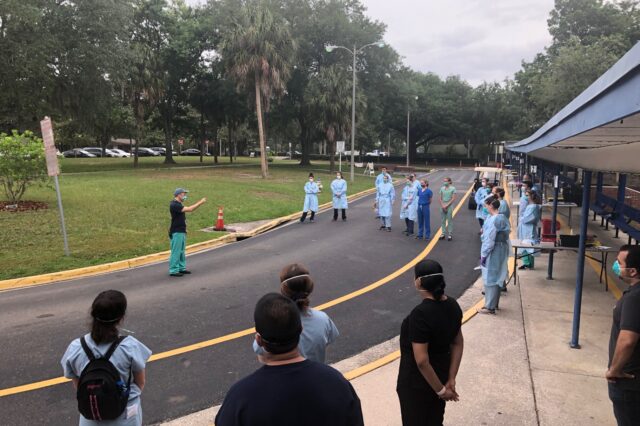UF study looks at the extent to which children contribute to coronavirus transmission

A new University of Florida study aims to gain a better understanding of the role children play in community transmission of COVID-19. Researchers also hope to learn how children and parents are coping with stressors associated with sheltering and learning at home during the pandemic.
Led by faculty in the UF College of Public Health and Health Professions, UF College of Medicine and UF College of Education, the study uses a non-FDA approved test for COVID-19 developed at UF. The study launched last weekend and aims to enroll more than 500 K-12 students from Gainesville’s P.K. Yonge, a developmental research school affiliated with the UF College of Education.
“Improved understanding of the epidemiology of COVID-19 in school-aged children is essential in our gaining a full understanding of disease transmission through the general population,” said Sarah McKune, Ph.D., M.P.H., a research assistant professor in the department of environmental and global health at the College of Public Health and Health Professions. “The study has been designed to contribute foundational knowledge necessary for public health officials to make evidence-based decisions on when to reopen schools, as well as model COVID-19 transmission in the general population.”
The study is believed to be one of the first of its kind in the U.S., and P.K. Yonge’s diverse student body offers an ideal environment, said Anthony Maurelli, Ph.D., a professor in the College of Public Health and Health Professions’ department of environmental and global health and a member of UF’s Emerging Pathogens Institute.
“The school’s enrollment represents Florida’s racial and income demographics,” he said. “The cross-sectional nature of the school population is ideal for public health — as well as educational — studies.”
Data from China suggest that children with COVID-19 experience milder symptoms than adults, and can be asymptomatic while shedding the virus in stool and oral/nasal secretions. Because COVID-19 testing in the U.S. has mostly been targeted at older people who have more severe illness or are in a high-risk group, little is known about how the virus is circulating among people who experience mild or no symptoms, including children.
“This knowledge gap leaves public health and public school officials blind when it comes to making decisions on when, how and why to open and close schools as we enter the ups and downs of the next phases of the outbreak,” said Eric Nelson, M.D., Ph.D., an assistant professor in the departments of pediatrics and environmental and global health and a member of the Emerging Pathogens Institute. “This study will provide insights into rates of infection over the next year, and the duration of viral shedding.”
These data will also help scientists incorporate children into predictive models on when, and if, the benefits of herd immunity might manifest in communities, such as Alachua County.
For the study, investigators are collecting throat swabs and blood samples from mostly asymptomatic children enrolled at P.K. Yonge whose parents have consented to participate in the research study. Children 8 years and older must also assent to participate. Swab samples will be analyzed for the virus that causes COVID-19 by technicians in Emerging Pathogens Institute labs using a laboratory-developed test designed by John Lednicky, Ph.D., a research professor in the department of environmental and global health. Researchers are also collecting blood samples for serological testing to determine if participants have been exposed to the virus.
The study team also developed an online survey to establish COIVD-19 related knowledge, attitudes, and practices among the families of school-aged children, as well as measure indicators of stress and resilience. Diana Joyce-Beaulieu, Ph.D., a scholar in the College of Education’s department of special education, school psychology, & early childhood studies, collaborated with the team to include additional questions for both the child and parent about the psychological effects of sheltering and learning at home under social distancing and concerns about public health.
“Students may be experiencing and responding to unique stressors, including greater expectations for school work independence, adapting to new school communication and learning methods, decreased peer interaction, observing increased family stressors and grappling with uncertainty about the future,” said study investigator Lynda Fender Hayes, Ph.D., director of P.K. Yonge. “In collaboration with our families and students, we hope to discover and understand resiliency and coping factors that may ease stress for students and their families, and help educators develop new emotional and mental health supports that will foster success for all students.”
Funding to support the early stages of this study was provided by the College of Public Health and Health Professions. Funding was also provided by the department of pediatrics in the College of Medicine and the Children’s Miracle Network.
“This study has the potential to answer some really important questions about the role that children may play in the COVID-19 epidemic, including how many may have contracted the virus but do not have symptoms, and whether children who are asymptomatic may contribute to the spread of the virus,” said Michael G. Perri, Ph.D., dean of the College of Public Health and Health Professions.
About the author
